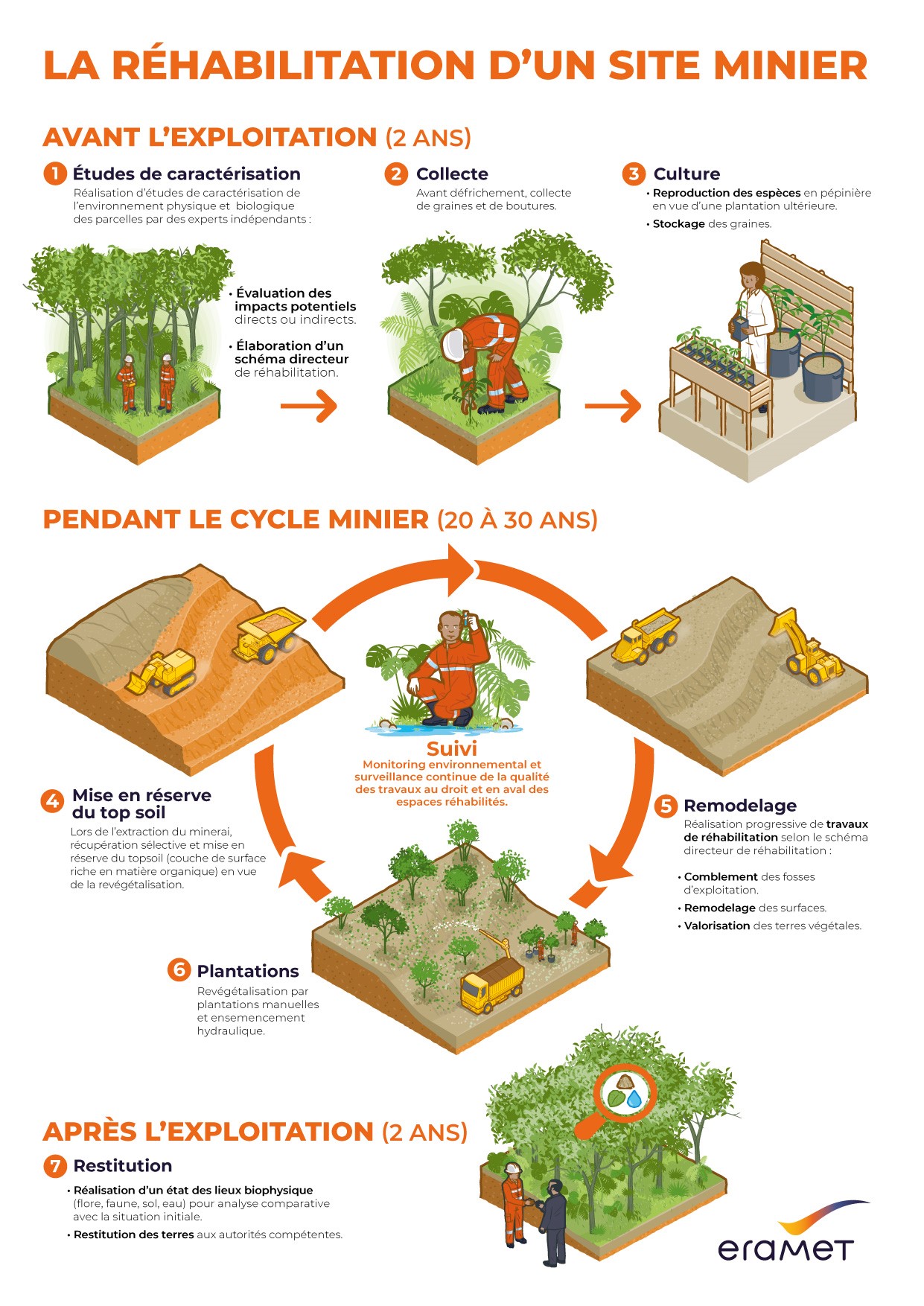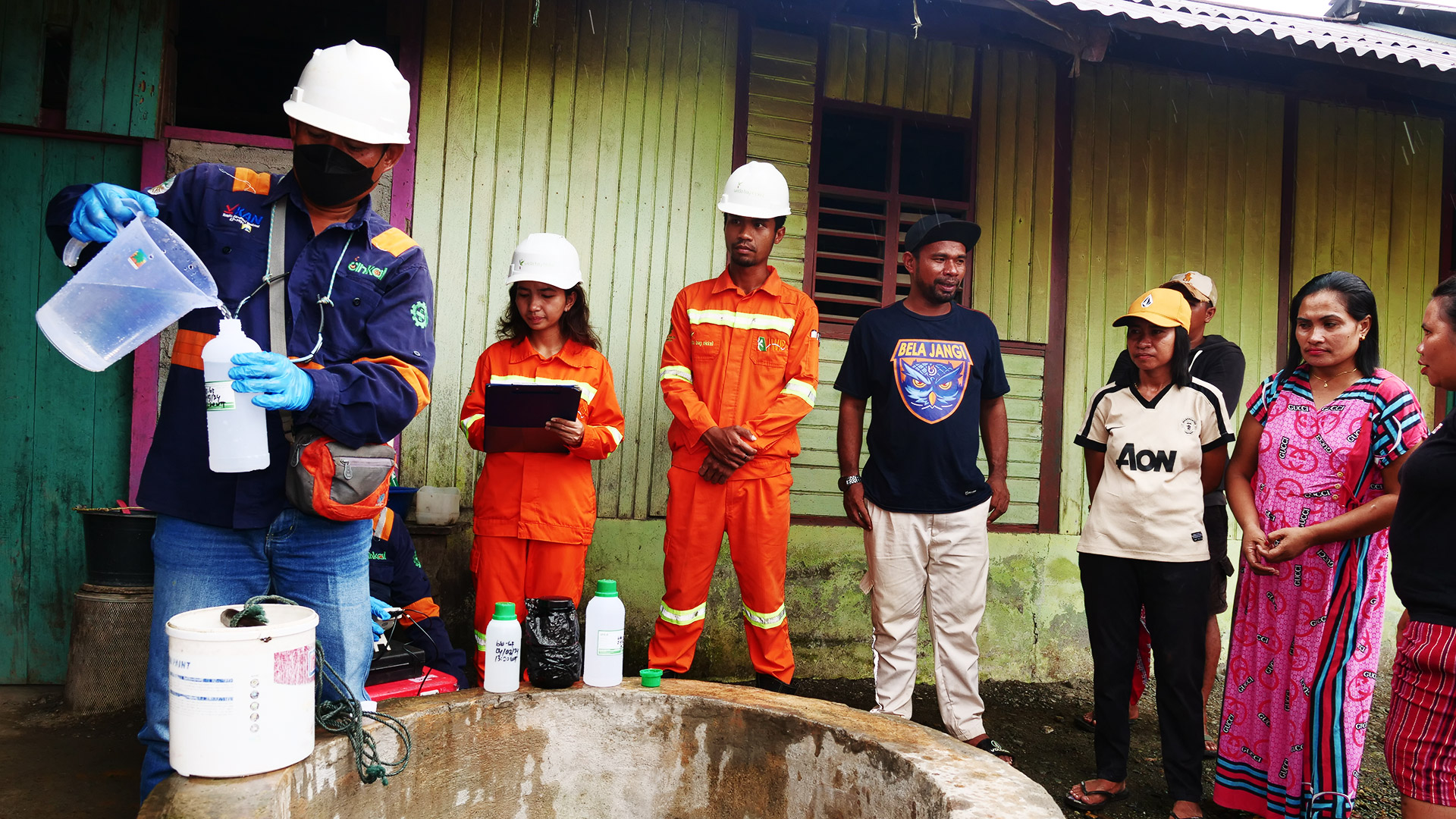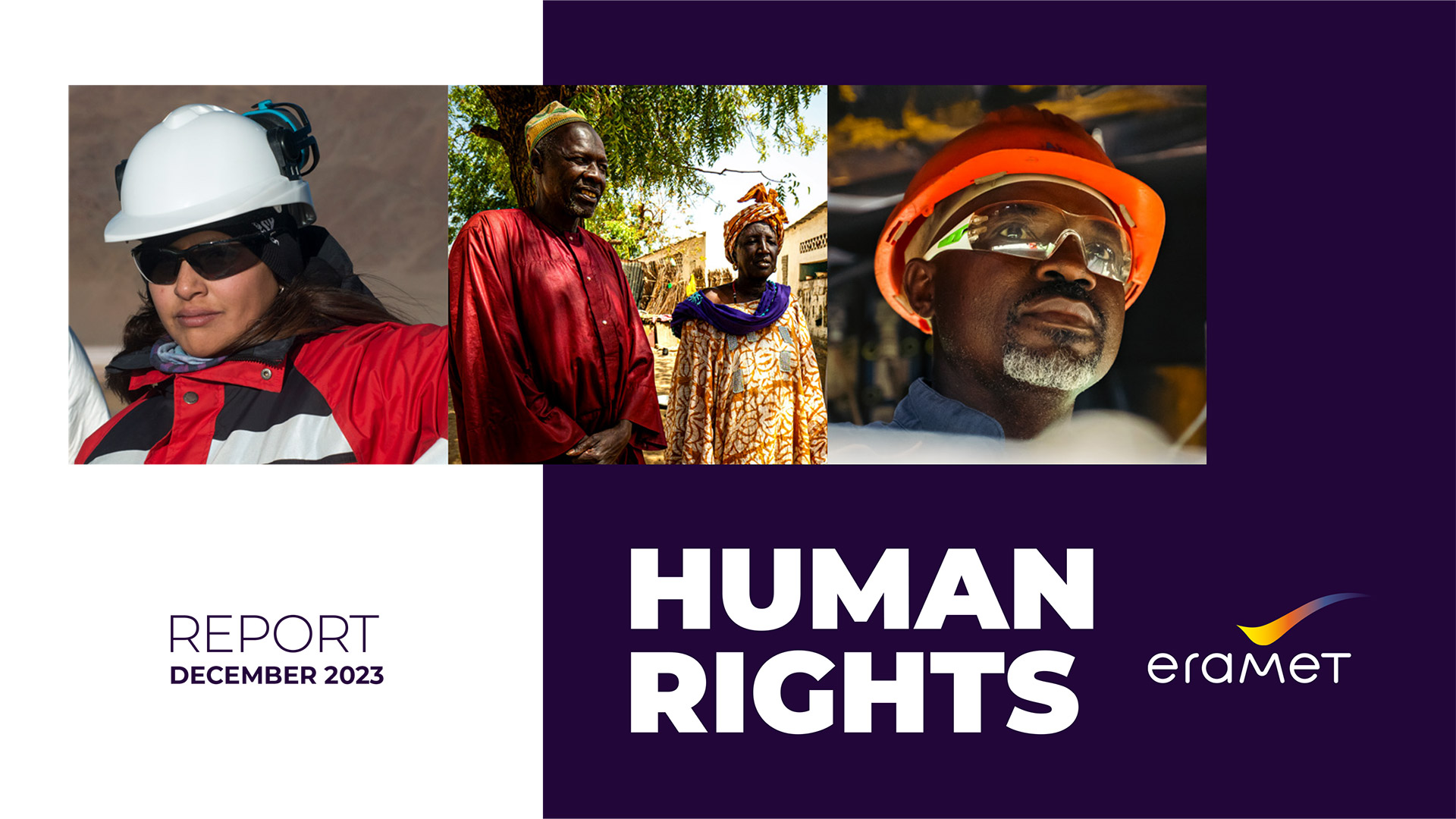CSR and human rights
Eramet has developed a responsible and transparent approach to its industrial and mining activities, notably through the implementation of its CSR standards and roadmap for all its subsidiaries. In the case of its minority interests such as PT Weda Bay Nickel, for which it provides technical expertise in particular, Eramet strives to promote its environmental and social commitments and best practices. Training sessions are organized.
In the framework of its partnership, Eramet carries out regular technical reviews to verify the site’s health, safety, environmental, social and mining performance, as well as compliance audits.
Eramet has voluntarily included PT Weda Bay Nickel in its human rights risk mapping scope, in the same way as all Group subsidiaries. As a result, specific issues have been identified and dedicated action plans put in place.
PT Weda Bay Nickel‘s extra-financial reporting voluntarily includes environmental and social performance data.
PT Weda Bay Nickel is included within Eramet Vigilance Plan as supplier. A special effort has been made to describe the risks and action plans linked to Weda Bay in 2023 Vigilance Plan after the questions from civil society the same year.
Environmental and biodiversity issues
Managing our environmental impact is an integral part of Eramet’s goals as a responsible mining company, in all countries where Eramet operates.
In the case of its minority interests, Eramet strives to promote its environmental commitments and best practices.
As part of PT WBN’s activities, fauna and flora surveys are systematically carried out prior to mining operations with specialists from the local Khairun University in Ternate, to identify and inventory the species present. These studies are complemented by a biodiversity action plan currently being put in place.
Rehabilitation and revegetation
A mining operation is part of a long cycle including several successive phases, from exploration to land reclamation, with an official mining plan incorporating measures to “Avoid, Reduce, Rehabilitate and Compensate” for the impacts of mining activities.
In Weda Bay, a nursery, with about 180 000 plants today, allowing to provide for current ecological restoration needs related to the mining reclamation plan has been set up on the concession, and two more are planned for construction in 2024, as close as possible to the new mine sites.
Once the ore has been extracted, the mining pits are reshaped with the part of the soil that does not contain nickel. The “top soil” is thus carefully recovered before extraction and set aside.
The final phase involves the planting of several local species bred at the nursery.

Water management
Prior to the opening of each mining site throughout the concession, local teams manage rainwater runoff. To channel it and prevent it from polluting rivers or the seashore, run-off water is channeled into mining structures known as settling tank or sedimentation basin.
In addition, water samples are taken regularly at theoutlet of the basins and in the rivers to measure their turbidity levels (TSS). Analysis results from stations selected by the authorities are automatically sent in real time to government supervisory authorities. Similarly, water samples are taken from wells in neighboring villages by an independent, certified laboratory, in the presence of community representatives.

Water quality sampling and analysis by an independent laboratory in the village of Gemaf, near the mine.
Social issues
Weda Bay Nickel‘s operations are located in two regencies on the island of Halmahera, in the Indonesian province of North Maluku. The six nearest villages are Lelilef Sawai and Lelilef Woebulan, Gemaf, Woejerana, Woekob and Kulo Jaya, representing a population of around 70,000. A few small groups of semi-nomadic people, the Forest Tobelo, also live in the interior of the Halmahera forests.
At Weda Bay, in accordance with its pratices, Eramet has engaged in ongoing dialogue with the surrounding village communities and local authorities right from the preliminary phase of the project, and has identified any risks associated with its activity.
Discussions focus in particular on the deployment of operations, environmental and social management measures, and programs to contribute to the local economy.
Community impact management
The work at PT Weda Bay Nickel began with impact studies. Since the 2000s, several studies have been carried out on various subjects affecting communities, such as population influx, cultural heritage, health, etc.
To ensure the safety of the communities living in the villages surrounding the mine, these studies led to the creation of specific roads for nickel transport, thus avoiding any coactivity between the roads used by the communities and those used for mining transport operations. In addition, roads used for mine transport are regularly watered to control dust.
Dialogue with local communities
At PT Weda Bay Nickel, 155 meetings were held in 2023 with communities on impact management, participatory environmental monitoring, complaint management and visits from local authorities. Group meetings and gatherings focused on the implementation of community investment projects or initiatives.
PT Weda Bay Nickel in Indonesia has a complaints management mechanism managed by IWIP (Industrial Weda Bay Industrial Park) on behalf of all the industrial park’s activities. 13 alerts exclusively concerning PT Weda Bay Nickel were registered in 2023, 80% resolved, in connection with land acquisition in forest areas, social impacts (traffic, road safety, local employment) and environmental impacts (water and dust).
Community investment
PT Weda Bay Nickel carried out a substantial contribution program in 2023 under the Education, Health and Infrastructure strategic pillars, benefiting more than 25,000 people.
Infrastructure
To improve living conditions for the nearly thousands of local residents, PT Weda Bay Nickel built 2 kilometers of village roads in Lelilef Sawai for an estimated 3,000 beneficiaries. In addition, 5 kilometers of drainage works were carried out in A Koulo Yaya for an estimated 3,000 beneficiaries. Lastly, sports facilities were built (a sports field at Gemaf) along with socio-cultural facilities (renovation of 20 mosques and 14 churches).
Education
A program was implemented to strengthen the teaching staff in secondary schools in the surrounding villages and university scholarships for 16 high school students in technical subjects, 52% of whom were girls;
Health
An endowment for three ambulances and a program of material and technical support for health centers were carried out (including donations of medicines) and benefited villages with a population estimated at around 20,000 people.
Impact indicators in Indonesia in 2023
More than 25,000 beneficiaries of positive contributions, including:
Impact management with O’Hongana Manyawa
Parts of Halmahera are home to the O Hongana Manyawa, also known as the Forest Tobelo, a mixed group of jungle dwellers, semi-nomadic who live in the island’s interior forests. The Tobelo people, of which the Forest Tobelo are a subset, are one of the 32 ethnic groups of the North Maluku. The name “Forest Tobelo” was coined by anthropologist Christopher Duncan, an international expert on these people, in 1997, to distinguish this Tobelo-speaking group from other Tobelo-speaking groups. As for the group itself, it calls itself O hongana manyawa or O fongana ma nyawa, meaning “people of the forest”, thus differentiating itself from the O berera ma nyawa who settled in the villages and on the coast.
The initial distribution of the Tobelo forest took shape at the beginning of the 20ème century. In 1915, the Dutch colonial government proposed that certain localities become settlement areas. However, a large part of the community chose to move into the forest, later called Forest Tobelo, after the colonial government attempted to levy taxes in these settlement areas.[1].
Over the course of the 20e and 21e centuries, various societal studies have shown that regular contacts were made between this community and the villagers, notably through bartering activities.
Since the beginning of the project, the forest Tobelos have regularly and voluntarily interacted with project employees. Over the years, PT Weda Bay Nickel has succeeded in developing respectful interactions with the forest Tobelos, some of whom may live or pass through on or near the Weda Bay concession.
A program of active engagement with the communities that have already been in contact with people living in the surrounding villages has been in place at PT Weda Bay Nickel for several years and sets out clear rules for all mine employees and subcontractors to interact in a respectful and culturally appropriate manner with the Tobelo community.
Following the start of operations at the end of 2019, a complementary study was carried out to better assess the risks of the mine’s impact on an identified semi-nomadic group. The initial results of this study showed that a group of 9 people belonging to this contacted community live within the perimeter of the mining concession. To date, studies have not reported any data demonstrating that Tobelo forest people living in voluntary isolation would be living in or around the WBN concession.
As an extension of this study and in order to continually improve our knowledge, a new study is being carried out in 2024 to deepen our understanding of the livelihoods of the O’Hongana Manyawa living on the concession and their interactions with ecosystem services, to design and deploy a complementary preservation plan where appropriate.
[1] P.J.M Baden (1929) in Memorie van Overgave van de Onderafdeling Tobelo
The IRMA standard for progress
In 2022, shareholders Eramet and Tsinghsan decided to commit the Weda Bay mine to the IRMA (Initiative for Responsible Mining Assurance) standard, the most demanding in the mining sector, based in particular on multi-stakeholder collaboration involving NGOs such as Human Right Watch and Earthworks. PT Weda Bay Nickel has undertaken to be audited against this IRMA standard by an external third party. Eramet was the first mining company to advocate IRMA in Indonesia, with a summit to be held in Jakarta in 2022.
The first internal IRMA self-assessments were also carried out in 2022 and 2023. A dedicated action plan is regularly monitored. Independent third-party auditing is planned from 2025.

